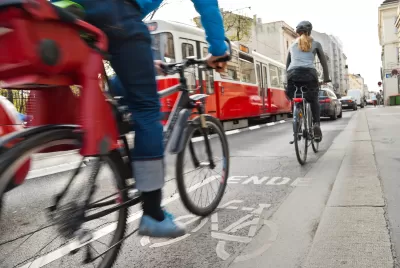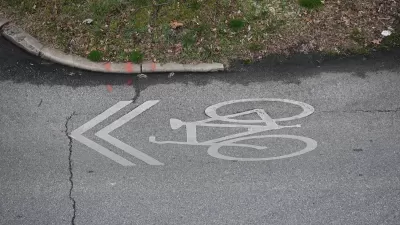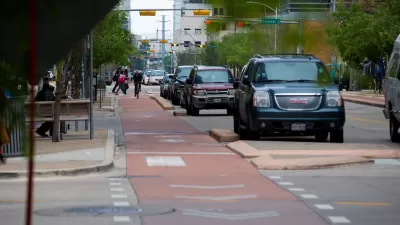Higher cycling rates are associated with significantly lower traffic deaths.

A new study reveals that small and mid-sized cities with higher rates of bike commuting and bike-friendly infrastructure have fewer traffic fatalities, reports Ron Johnson on Momentum.
“The study dives deep into the factors behind this safety paradox, and the conclusions pointed at the importance of cyclists on city streets,” Johnson explains. Pedestrian deaths in cities with low cycling rates were 193.8 percent higher than in their counterpart cities.”The study also noted that in most cases there were not enough bicyclist fatalities to be statistically relevant, but there were enough pedestrian fatalities.”
According to the researchers, “Low density neighbourhoods and cities with wide roads will continue to attract more car users and make it difficult to create a shift in mode that will keep all road users safe, the study suggests. We need density, compact neighbourhoods, and narrow roads.”
FULL STORY: Study shows bicycle-friendly cities are safer for all road users even drivers

Manufactured Crisis: Losing the Nation’s Largest Source of Unsubsidized Affordable Housing
Manufactured housing communities have long been an affordable housing option for millions of people living in the U.S., but that affordability is disappearing rapidly. How did we get here?

Americans May Be Stuck — But Why?
Americans are moving a lot less than they once did, and that is a problem. While Yoni Applebaum, in his highly-publicized article Stuck, gets the reasons badly wrong, it's still important to ask: why are we moving so much less than before?

Using Old Oil and Gas Wells for Green Energy Storage
Penn State researchers have found that repurposing abandoned oil and gas wells for geothermal-assisted compressed-air energy storage can boost efficiency, reduce environmental risks, and support clean energy and job transitions.

Updating LA’s Tree Rules Could Bring More Shade to Underserved Neighborhoods
A new USC study finds that relaxing Los Angeles’ outdated tree planting guidelines could significantly expand urban tree canopy and reduce shade disparities in lower-income neighborhoods, though infrastructure investments are also needed.

California's Canal Solar Projects Aim to Conserve Resources and Expand Clean Energy
California’s Project Nexus has begun generating electricity from solar panels installed over irrigation canals, with researchers and state agencies exploring statewide expansion to conserve water and boost clean energy production.

HHS Staff Cuts Gut Energy Assistance Program
The full staff of a federal program that distributes heating and cooling assistance for low-income families was laid off, jeopardizing the program’s operations.
Urban Design for Planners 1: Software Tools
This six-course series explores essential urban design concepts using open source software and equips planners with the tools they need to participate fully in the urban design process.
Planning for Universal Design
Learn the tools for implementing Universal Design in planning regulations.
Heyer Gruel & Associates PA
City of Moreno Valley
Institute for Housing and Urban Development Studies (IHS)
City of Grandview
Harvard GSD Executive Education
Salt Lake City
NYU Wagner Graduate School of Public Service
City of Cambridge, Maryland





























